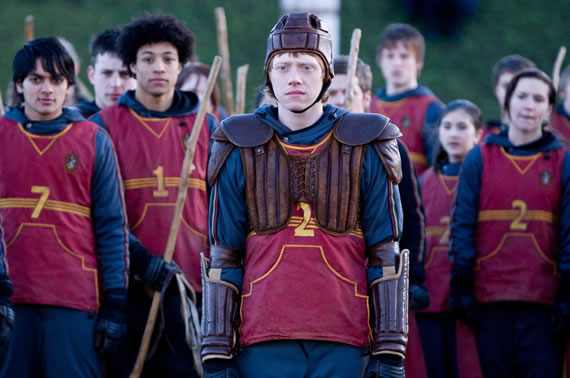Have you ever wished that you could fly through the air on a Nimbus 2000 while chasing an ever allusive golden snitch? Do you dream about having front row seats to the World Cup as you turn in after long nights of studying in the Muggle World?

Unfortunately, Hagrid most likely won’t be knocking down your dorm door to tell you that you’re actually a wizard any time soon. But fear not; being just a plain old Wheaton student might just be enough. Thomas Nagata ’15 and Caity Claflin ’15 have recently had their idea for a Quidditch Club approved by the Student Government Association (SGA).
When Nagata was applying for schools last year, he became increasingly interested in the prospect of playing on a Quidditch team. He chose to come to Wheaton, but noticed that the college didn’t have one. The thought of starting one himself then came about and stuck with him ever since.
Fellow FYS classmate, Claflin wanted to help out, and is now one of the club’s co-founders. Using Claflin’s Quidditch Rule book and the Wheaton College Club Guidelines, the two hammered out their constitution and are ready to start recruiting members. Claflin stated, “Everyone is welcome and we’re looking to have fun”.
But what does one do as a flightless member of a Muggle Quidditch team? “Well, you have to have a broom between your legs at all times, though swiffers are sometimes allowed”, Nagata says. The broom isn’t the only part of Muggle Quidditch that mirrors its Magical counterpart. Each team has seven players consisting of three chasers, two beaters, a keeper, and a seeker.
The goals of the game are also the same, such as getting quaffles into goals, avoiding bludgers, and catching the golden snitch. Of course, a human Quidditch team has to use their creativity when playing a game originally intended for magic. Most supplies for the game could probably be found in a gym or custodial closet. “The quaffles are actually slighty deflated soccer balls”, Claflin states. “And the snitch is actually a tennis ball attached to the waistband of a snitch-runner using a sock” Nagata adds.
As the Quidditch Club gains a substantial amount of members, it can become a part of the International Quidditch Association (IQA) and play a number of different teams from the area. The team would also gain chances to compete in the World Cup, which is held in New York City. Nagata and Claflin claim that the making it to the World Cup would be a challenging goal as a newly formed team, but that they plan on at least going to watch. Nonetheless, both co-founders look forward to practicing and playing Quidditch, and highly encourage people to come join in not only in playing with cleaning supplies, but also in the worldwide phenomenon that helps keep the tradition of Harry Potter alive. “We might be crazy people running around in the Dimple”, both founders agreed, “but there are people all over the world just like us.”
So it’s alright, take out that copy of Quidditch Through the Ages you have been secretly hiding in your sock drawer. It’s time to make new friends, and embark on adventures of your own.
For more information about Wheaton’s team, Claflin and Nagata suggest to keep a look out for any posters that may appear about campus. A Facebook page is also up for interested students to join. (https://www.facebook.com/groups/294288470585239/). Any questions or comments can also be sent to Thomas Nagata (nagata_thomas@wheatoncollege.edu) or Caitlyn Claflin (claflin_caitlyn@wheatoncollege.edu)
